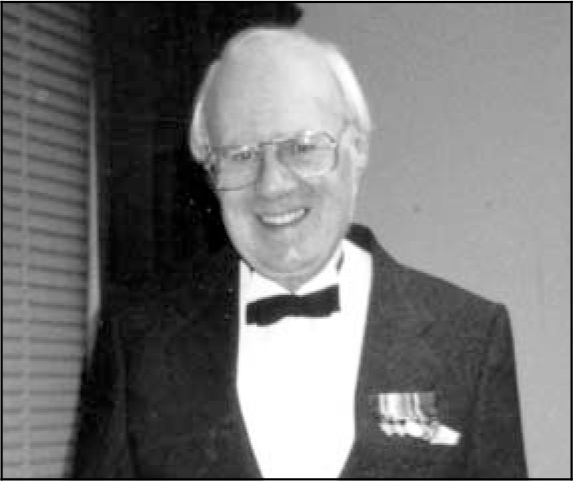James McHarg V.R.D. died on 10 March 2003, in his 86th year.

He graduated in Medicine at Edinburgh University in 1940 and then served in the Royal Navy, first on an Atlantic convoy destroyer and then as senior medical officer to a submarine base, achieving the rank of surgeon-commander.
In civilian life, his professional career was spent in three Scottish Royal Psychiatric Hospitals; the Royal Edinburgh, Gartnavel Royal (Glasgow) and Royal Dundee Liff. In Edinburgh, he was strongly influenced by Sir David Henderson and also by Professor Jan Rostowski – an impressive refugee Polish professor of neurology. From these years, he developed a lasting interest in neuropsychiatric syndromes. However, he was not a narrow specialist. On the contrary – he was an avowed general psychiatrist, and indeed sceptical of the formal specialisation that has marked the development of psychiatry in recent decades.
From Edinburgh, he moved to Gartnavel as Deputy Physician Superintendent. He was awarded his MD with commendation in 1959 for a thesis on Schilder's disease (diffuse sclerosis). He published on childhood mania, an important contribution to the literature on affective psychosis in children, and began to collect cases of torsion dystonia, a condition not infrequently misdiagnosed, in his view, as hysteria, and he became a valuable adviser to the Dystonia Society. He was highly regarded by his colleagues as a clinician and as a stimulating adviser to junior staff.
After Glasgow, he moved to Dundee as Consultant and Honorary Senior Lecturer in the Department of Psychiatry of Dundee University, until his retirement in 1981. By then he had been elected a Fellow of the Royal College of Physicians of Edinburgh in 1958 and, in 1971, a Foundation Fellow of the Royal College of Psychiatrists in 1971. His interest in the latter led him to found the McHarg Essay Prize, awarded to a trainee psychiatrist who had produced an outstanding research paper.
In his latter working years, James encountered patients who reported ‘paranormal’ experiences and he explored this material with characteristic tenacity and rigour. He became a member of the Society for Psychical Research and corresponded widely with fellow members, abroad as well as in the UK. As recently as last year, he presented a well-received paper on ‘Poltergeists’ to the Senior Fellows of the Royal College of Physicians of Edinburgh.
Mention must now be made of James McHarg as an historian. In researching his family tree he encountered ancient forgotten documents which he realised were of relevance to the early history of the College of Physicians of Edinburgh. There followed years of painstaking research, crowned in 1997 by the publication of his book In Search of Dr. John MakLuire: Pioneer Edinburgh Physician, forgotten for over three hundred years. His researches were, however, not exclusively into medical history. For example, just this year, he published a successful identification of a 17th century warship shown in an obscure painting in Aberdeen Maritime Museum. It was proved to be, in fact, the flagship of the pre-Union Scots Navy.
James was a devout man, widely read in theology, theological history and philosophy; his participation in the life and councils of the Scottish Episcopalian Church was one of the key influences in his life and was widely appreciated. He will be remembered as a quietly humorous and kindly man, a generous and loyal friend and a compassionate doctor. He did not marry, but was a devoted uncle to his nephew and three nieces, the four children of his deceased sister.



eLetters
No eLetters have been published for this article.